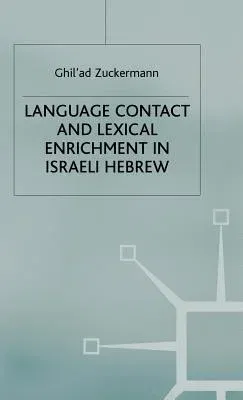G Zuckermann
(Author)Language Contact and Lexical Enrichment in Israeli Hebrew (2003)Hardcover - 2003, 4 November 2003

Qty
1
Turbo
Ships in 2 - 3 days
In Stock
Free Delivery
Cash on Delivery
15 Days
Free Returns
Secure Checkout

Part of Series
Palgrave Studies in Language History and Language Change
Print Length
294 pages
Language
English
Publisher
Palgrave MacMillan
Date Published
4 Nov 2003
ISBN-10
140391723X
ISBN-13
9781403917232
Description
Product Details
Author:
Book Edition:
2003
Book Format:
Hardcover
Country of Origin:
US
Date Published:
4 November 2003
Dimensions:
22.25 x
13.82 x
2.06 cm
ISBN-10:
140391723X
ISBN-13:
9781403917232
Language:
English
Location:
London
Pages:
294
Publisher:
Weight:
471.74 gm